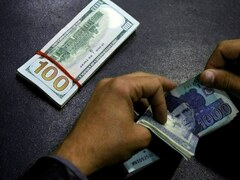Funeral prayers of former President of Pakistan, Farooq Ahmad Khan Leghari, were offered in Choti Zaireen in Dera Ghazi Khan on Wednesday afternoon and were attended by a large number of political workers, lawyers, journalists, landlords, traders and other people from different walks of life, besides his sons Senator Jamal Khan Leghari and former federal minister for telecommunication Owais Khan Leghari.
He was laid to rest in his native town of Choti Zereen's graveyard. Farooq Leghari died in the early hours of Wednesday at the Armed Forces Institute of Cardiology in Rawalpindi. He was 70 and a heart patient for some time. His use of presidential powers while in office left a deep and lasting impact on Pakistan's politics - impacts that Pakistan is still reeling from.
A one-time civil servant, schooled at Aitchison College, FC College, Punjab University and Oxford University, Leghari was a Baluch sardar and reportedly a major land owner with 10 square kilometres of land ownership. Hospital sources said he was a heart patient and was under treatment for heart-related disorders. Farooq Laghari breathed his last at 1:45 am, hospital sources confirmed. He was on ventilator due to deteriorating health conditions.
Once a PPP stalwart and close confidant of Benazir Bhutto, he would later turn against her and prove instrumental in her eventual fall from power. In fact, it was that closeness that elevated him to the Presidency in 1993, as he was considered loyal, dependable and reliable. In the end he proved to be anything but that for BB, and became a central actor in her removal from office as he removed his own party's government under Article 58 2(b) on charges of corruption, lawlessness and extrajudicial killings.
Farooq (May 29, 1940 - October 20, 2010) was the eighth President of Pakistan, from November 14, 1993 to December 2, 1997. He was the first Balouch to become President of Pakistan. He was born in Choti Zareen, a village of Dera Ghazi Khan District, Punjab on May 29, 1940 during the British Raj. He came from a political family that has been active in politics in this part of the world since pre-colonial days. His father, Sardar Muhammad Khan Leghari, and grandfather Nawab Sir Muhmammad Jamal Khan Leghari, had both been ministers.
After his initial schooling at Aitchison College, Lahore, where he was the head boy and was declared the Best Leaving Student of 1957. He graduated with honours from the Forman Christian College, Lahore, Punjab where, again, he was among the best students. He went on to study Philosophy, Politics and Economics (PPE) at Oxford University. On return to Pakistan he joined the Civil Service and served for some time in East Pakistan (now Bangladesh).
On the death of his father he resigned from civil service and came back to his roots to look after the affairs of his tribe. He was the head (sardar) of the Leghari tribe. He joined Pakistan People's Party, and was made leader of the party on imprisonment of Z A Bhutto. He was put under house arrest several times during military regime of Gene Zia-ul-Haq.
In 1993, with the express support of Pakistan People's Party, Leghari ran for the office of President and won the election against Wasim Sajjad. In November 1996, using his powers under Article 58 2(b) of the Constitution of Pakistan, he dismissed the People's Party government of Benazir Bhutto on charges of corruption, lawlessness and extra-judicial killings.
Following the word of the Constitution of Pakistan he held elections for National Assembly in 1997. The elections were won by Pakistan Muslim League, and Nawaz Sharif was elected Prime Minister. A decisive majority in the Lower House of parliament led the Sharif government to remove the controversial 8th Amendment from the constitution of Pakistan.
Leghari saw this as a threat to his power and with the alleged aid of the then Chief Justice of the Supreme Court, Sajjad Ali Shah, he sacked the Sharif government. This led to an uprising against him and Shah, forcing both to resign. Instead of retiring from politics, he went on to create his own political party, the Millat Party, which entered into a coalition of seven parties known as National Alliance, to participate in the general elections of 2002.
The National Alliance, emerged as the 3rd largest group in the parliament and won 13 seats in the National Assembly. He entered in coalition with the majority party to form the government, and his son, Awais Leghari, was made a federal minister for Telecom and IT. Another of his deputies, Yar Mohammad Rind, was also inducted in the Federal Cabinet.
Later, Mohammad Ali Durrani and his niece Sumaira Malik from his party were inducted into the Federal Cabinet. With National Alliance being merged with ruling Pakistan Muslim League (Q) in May 2004 to form a united Pakistan Muslim League, Farooq Leghari also became member of the newly constituted party, with his son Awais Leghari being one of its senior vice presidents. His elder son Jamal Leghari has recently been elected to the Senate. His daughter Faryal Leghari is an analyst and researcher in Security & Terrorism Studies at the Gulf Research Centre in Dubai.
BR100
11,970
Decreased By
-95.3 (-0.79%)
BR30
35,510
Decreased By
-255.9 (-0.72%)
KSE100
113,317
Decreased By
-746.8 (-0.65%)
KSE30
34,688
Decreased By
-345.7 (-0.99%)




















Comments
Comments are closed.